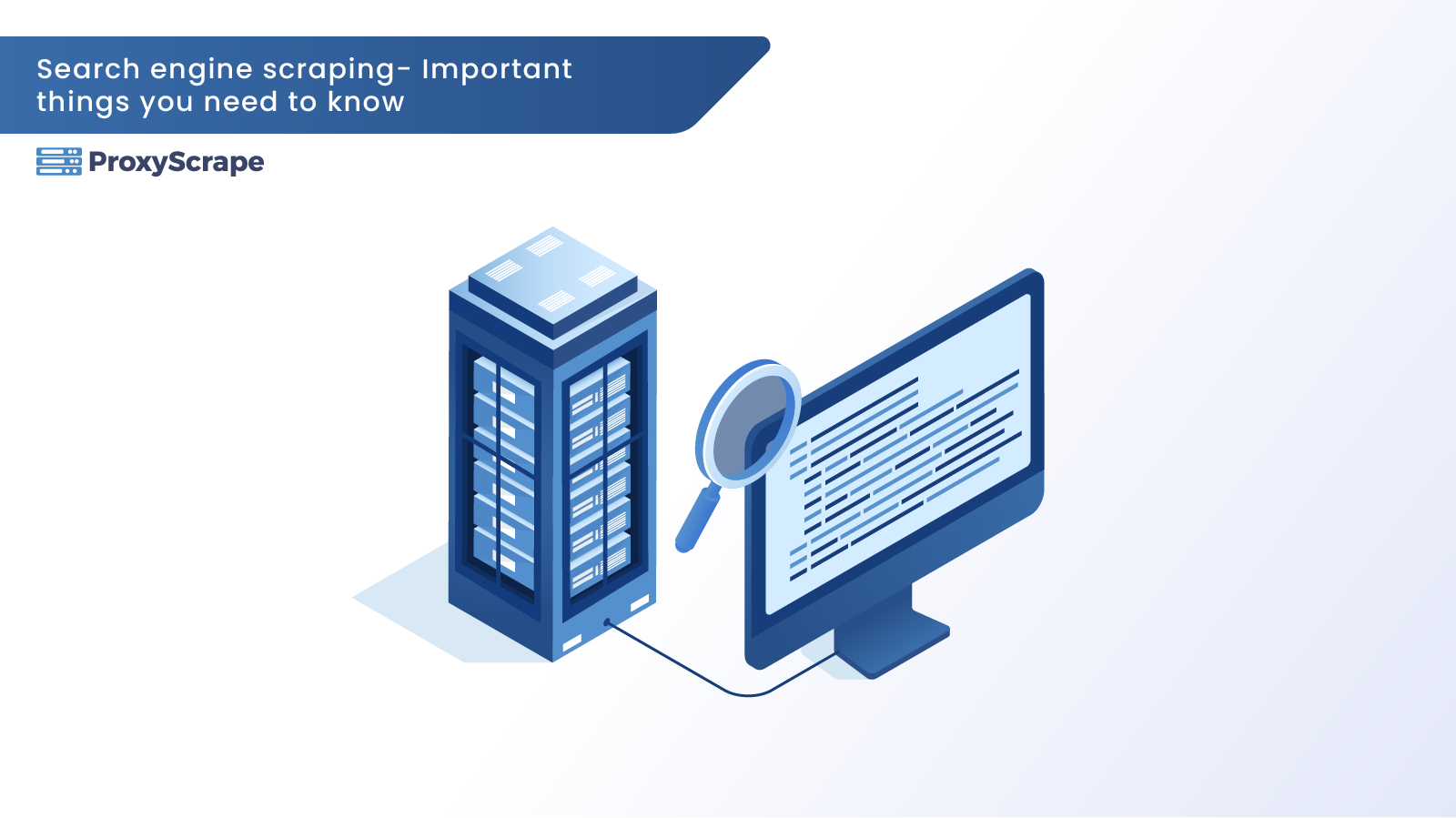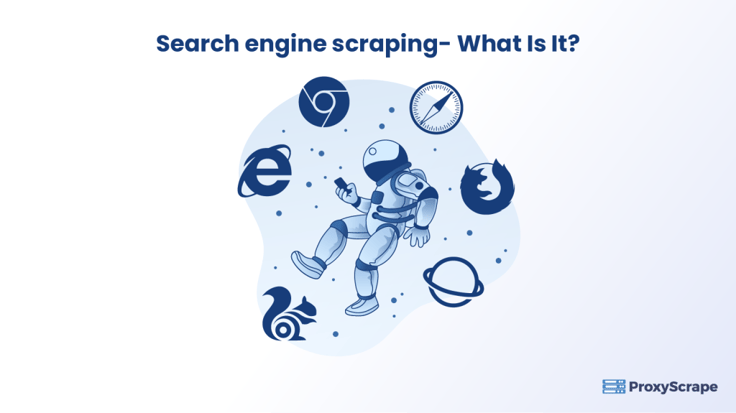Search Engine Scraping– Exciting Things to Know in 2026

Have you heard the term web scraping? If you haven’t, web scraping is a method of collecting data from various sources online using a web scraping bot or manual programming scripts (python or machine learning algorithms). With this method, you can scrape any form of data, such as text, numbers, and special characters, in a
Have you heard the term web scraping? If you haven’t, web scraping is a method of collecting data from various sources online using a web scraping bot or manual programming scripts (python or machine learning algorithms). With this method, you can scrape any form of data, such as text, numbers, and special characters, in a short period. Web scraping is helpful for various cases, such as competitor analyses, market trend analyses, SEO analyses, and monitoring.
Did you know that Google processes 20 petabytes of data every day? This includes the 3.5 billion search queries processed by the Google search engine. If you tap into that data pool, developing an innovative idea to solve people‘s everyday problems would be helpful. You could do this by implementing search engine scraping. In the upcoming block, we will learn about search engine scraping.
Feel free to jump to any section to learn more about search engine scraping!
What Is Search Engine Scraping?
How Does Search Engine Scraping Work?
Difficulties Involved in Search Engine Scraping:
How to Scrape Google SERP Data Effectively?
Which Proxy Is Best for Google SERP Scraping?
The Best Proxy Provider for Your SERP Scraping:
What Is Search Engine Scraping?

Search Engine Scraping- What Is It?
Search engine scraping, also known as SERP scraping, is a process of scraping data, such as URLs, meta descriptions, and other public information from search engines. This scraping is unique since it is dedicated to scraping only search engine information. You can implement SERP scraping for any search engine, such as Bing SERP, Google SERP, and Yahoo SERP.
Mostly, digital marketers use this technique to scrape data, like keywords that are trending for a particular niche in search engines like Google, Bing, and Yahoo. Search engine scraping determines their customer’s website ranking and competitive positioning based on their focused keywords and the index status.
As mentioned, you can scrape a large amount of data. A large amount of data means a more extended period. To save time, you can automate the process using any scraper bot or API.
But Google is smart. They have taken measures to block any automated process to their services. Google servers can stop you if you use a scraper bot or manual programming script to scrape Google data. The primary purpose is to market their APIs to the users.
How Does Search Engine Scraping Work?
Search engine scraping works the same as any other web scraping. Usually, there are two essential things involved in web scraping. One is a crawler, and the second is a scraper.
The function of the crawler is to crawl through the content. This crawler is built using machine learning/deep learning (AI-Artificial Intelligence) algorithms to follow specific patterns to identify crucial information that will be helpful for the customers. One of the popular patterns is the F-pattern. Crawler bot crawls through your F-shape content to identify crucial information, such as images, focused keywords in headings, and semantic keyword densities. So, understanding how search engines crawl is the first step to improving your online business.
Next is a scraper. Once the crawler crawls through your content and gets the necessary information, it will pass it to the scraper. The scraper knows what to scrape, such as focused keywords, URLs, meta descriptions, and other information influencing SEO rankings (Search Engine Optimization).
After scraping data, you can download the information in any format you prefer. Universally, CSV (Comma Separated Value) is being followed to save the information in a database format. The main reason for keeping data in CSV format is that it is easy to transfer data to cloud format and even feed data to machine learning and deep learning neural networks for analyses since the CSV format resembles database format, which is preferred for machine learning analyses.
If you look closely into how search engine scraping works, it resembles the Google search engine algorithm. Since the algorithm resembles it, you can rest assured that you can improve your online business significantly with the help of search engine scraping.
It may look easy upfront, but some difficulties involve scraping Google SERP.
Difficulties Involved in Search Engine Scraping:
It is legal to scrape data from Google SERP, but it has deployed several measures preventing you from efficiently performing web scraping. The following are some of the difficulties involved in search engine scraping:
- Google implemented a very complex algorithm in a request rate system. The algorithm focuses on monitoring request rate limitations. This can vary based on language, physical location, the server agent, the focused keyword, and other parameters. The important thing to note here is that the user cannot possibly know the request rate limitation, which makes the system unpredictable. Since web scraping is an automated process, it makes hundreds of requests to Google servers; since it does not resemble human nature, the Google server blocks you from the server.
- Google is smart in doing regular updates to its defense system. It makes it difficult for developers to adapt to the situation and alter their scraper code to scrape data efficiently.
- Scraping a dynamic webpage is hard. If the developers make changes in the HTML code, you must change your scraping script and rerun it to get the data. There is no way to know beforehand whether the developer made changes in the HTML code; this makes it difficult to scrape data and can ultimately lead to a waste of resources.
- IP address plays a major role in web scraping. IP addresses or Internet Protocol addresses are responsible for carrying your request to access the data to the target server. The target server will accept the request and grant access to the information based on your IP address. This difficulty is tied with another difficulty request rate limitation. Since there is a request limit, your IP address can request a certain amount of times; after that, it will be flagged as abnormal behavior, and the target server (Google server) will block your IP address and render you unable to access information.
How to Scrape Google SERP Data Effectively?
One better way to perform SERP scraping effectively is scraper API and a reliable proxy. These are the two things needed to scrape data:
What Is Proxy?
A proxy server is an intermediary server that sits between you (the client) and the target server (online). Usually, your internet request is directly routed to the target server and gets the data on one condition, which is your IP address. Your IP address is tied to your physical location. The target server will check for any restrictions imposed on your country; if there are any, your request will be denied; if not, you will get access to the information.
To access geo-restricted content, you must reroute your internet traffic through a third-party server. This is what a proxy server does. It will reroute your internet traffic through its server and mask your original IP address. This way, you can “trick” the target server by saying that you are accessing the information from the desired country.
What Is Scraper Bot or API?
Scraper API, in simple terms, is a SaaS (Software as a Service), which is used to scrape and retrieve data in any format automatically. Python is the programming language that helps to build that scraper bot. The only step you need to do is integrate the API with your application. This eliminates the process of creating a new web scraping tool from scratch.
You can scrape data online by integrating proxy with scraper API with no problems. Proxy helps you to mask your original IP address, where scraper API will do the web scraping automatically. This is the best combination to get maximum work in the web scraping process.
Which Proxy Is Best for Google SERP Scraping?
As said, Google is smart enough to detect your IP address. You should look for rotating proxies, and at the same time, they should resemble ISPs (Internet Service Providers) IP; only then will it be easy to trick the target server. By knowing the requirements, the best solution is a residential proxy.
The Best Proxy Provider for Your SERP Scraping:
ProxyScrape is one of the best proxy providers online. With three types of proxy services, such as dedicated datacenter proxies, residential proxies, and premium proxies, you can rest assured that you can get proxies for any type of online task. Out of the three proxies, residential proxies are best suited for highly demanding tasks, such as web scraping and SEO analysis. The reasons are:
- ProxyScrape’s residential proxies are rotating proxies. Rotating proxies rotate their IP address independently, making it difficult for the target server to identify and block you. You will get a new IP address whenever you connect to ProxyScrape’s network.
- With 7+ million proxies in the proxy pool, you are guaranteed to get your proxy at any point in time.
- You can choose the country you want by appending the country code (available on the website) at the end of the proxy password. This way, you can break the barrier and enjoy geo-restricted content or efficiently perform web scraping.
- The other features are username and password authentication for more security, unlimited bandwidth for high internet demanding tasks, unlimited concurrent connections, 99.9% uptime guaranteed, and excellent customer service, who will solve your problems within 24-48 hrs.
FAQs:
FAQs:
1. Is it legal to scrape Google search results?
2. What is the best proxy for SERP scraping?
3. Which is the best programming language to perform search engine scraping?
Conclusion:
Web scraping is a powerful tool for various purposes online. You can scrape data and feed the data to any machine learning algorithm that can predict the stock market value. You can also perform search engine scraping to get the Google result data, and, based on that data, you can optimize your or your customer’s website and make them shine among their competitors. Proxies are a great companion to a web scraping tool that hides your IP address and makes you anonymous online.